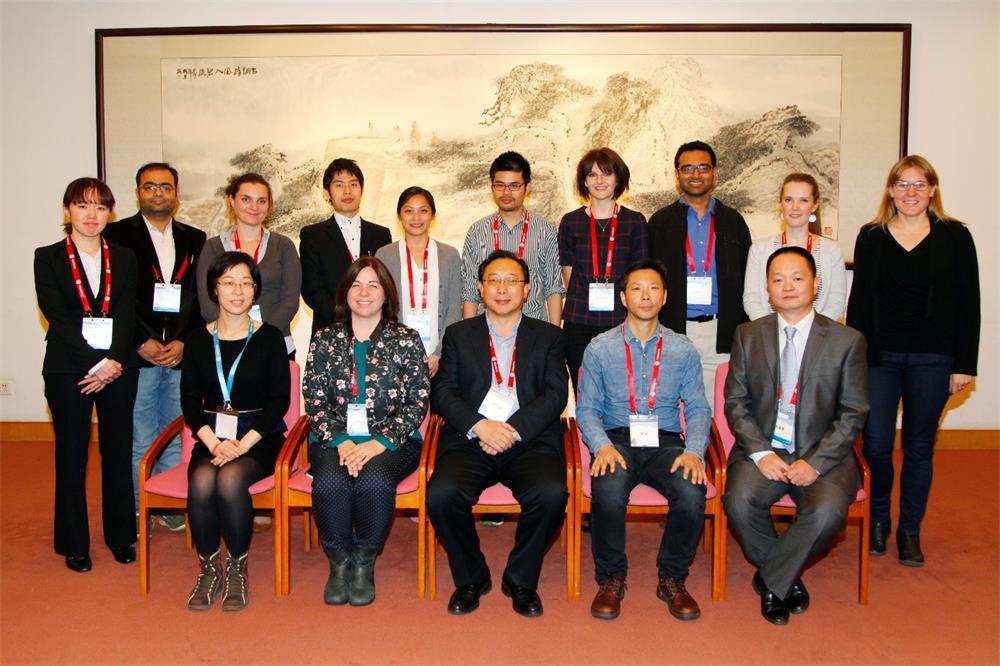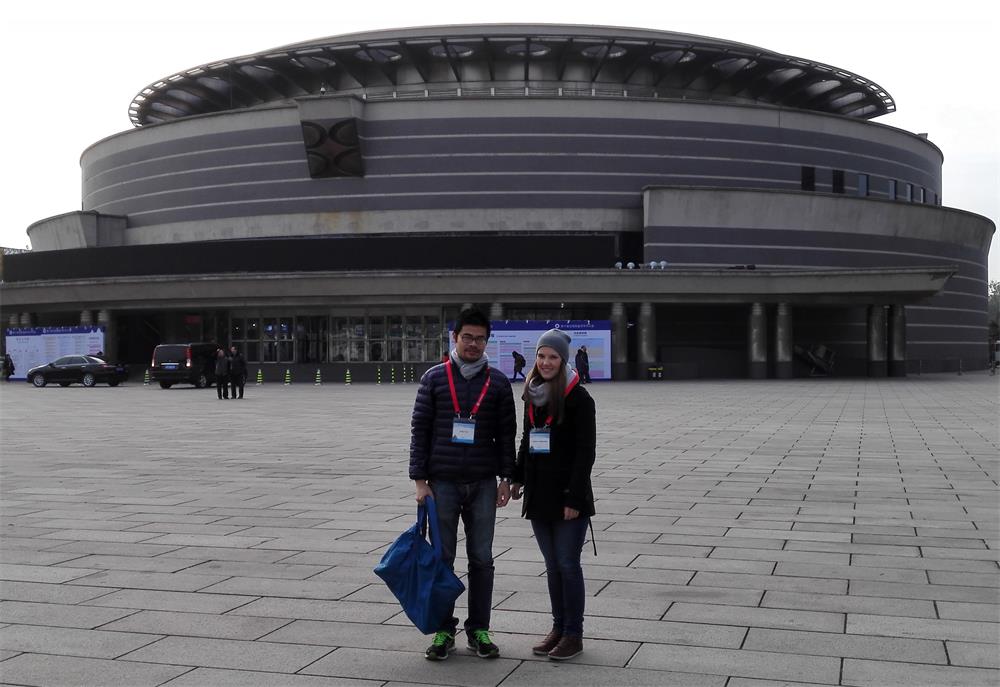Report on the 10th CSI Annual Meeting by German Young Immunologists invited and sponsored by CSI
Source:Yilang Tang and Claudia Reschke
2016-01-26
Eleven international young immunologists consisting of PhD students and post-docs from Australia, Brasilia, France, Great Britain, Japan, Germany, India and USA were invited and sponsored to attend the 10th Annual Meeting of the Chinese Society for Immunology 2015 in Beijing, China, – and we, Yilang Tang from Mainz and Claudia Reschke from Berlin, were part of this exciting event. We were lucky to obtain a travel grant from the German Society for Immunology (DGfI), whereas registration, accommodation and catering were totally covered by the Chinese Society for Immunology (CSI).
非常感謝(Thank you very much.)
For us, the adventure started on 14th of November 2015: After a 10-hour flight, we finally arrived at Beijing.
The meeting itself took place at the Beijing Conference Center, which is located in the North and covers a huge complex of conference buildings and guesthouses embedded in a garden-like structure. After our arrival at the Beijing Conference Center, we were welcomed by Dr. Jie Yao, a secretary of the Chinese Society for Immunology. She and a group of volunteers, easily identifiable by their red sweaters, helped us with everything during our stay. This was important as not speaking or reading any Chinese could easily become a problem.
The 3-day meeting took place from 15th to 17th November 2015. The first day started with an opening ceremony in the great lecture hall of the Conference Building, which provided enough space for about 2000 participants from China and abroad. After Prof. Cao Xuetao and Prof. Tian Zhigang gave the warm welcome lecturesKey, Prof. Alberto Mantovani, the Vice-President of International Union of Immunological Societies announced, that the 17th International Congress of Immunology willalso be held in Beijing. We are sure that this will be a great scientific event of high standard!
Then, theinternational guest speakers from Australia, Germany, Italy and USA gavekeynote lectures covering the whole diversity of immunology. Among them, Prof. Frederick Alt, Prof. Zhijian Chen, Prof. Ronald Germain, Prof. Dieter Kabelitz, Prof. Jacques Miller and Prof. AndreasRadbruch were invited. We learned the recent progresses in the field of B cell immunity, the detection of cytosolic DNA by the immune system, how the immune system fights cancer and how we can use this knowledge to treat cancer! Moreover, we were taken on a historical journey through the discovery of the thymus, learned the recent imaging techniques to illustrate the host immune responses and many more. The lectures of all speakers were of very high level!
In the evening, the Chinese Society for Immunology invited all guest speakers and international young immunologists to a typical Chinese dinner with original Beijing Roast Duck and a lot of rice vine! This was also a great opportunity for us, the young immunologists, to get to know each other and to speak to the guest speakers and organizers. It was an unforgettable evening!
On the second day, the “International Young Immunologist Forum” took place and it was up to us to present our research within 15-minute talks. The talks covered several aspects of the immune system from basic research to possible treatment strategies. We gained a deeper insight into the rearrangement of the B cell receptor, the role of ubiquitylation in the complement activation, the TGFβ signaling within T cells and the impact of epigenetic changes in endotoxin tolerance. Additionally, several treatment strategies among others were illustrated: The role of microRNAs in Chargasdisease, the influence of microbiota in the usage of cytotoxic T lymphocyte antigen-4 (CTLA4)-blocking antibodies in melanomas and the usage damage-associated molecular patternsagainst inflammation and cancer.

We especially thank the chairpersons, Taoyong Chen and Yuting Ma, as well as the audience for making this a wonderful workshop with lively discussions.
Furthermore, we were offered to see the laboratories of the Chinese Academy of Medical Sciences, which is the only state-level academic center for medical sciences in China and, thus, offers a high level of scientific research.
In conclusion, the meeting was a great experience – both scientific and non-scientific – and we do not want to miss the impressions we made. Once again, we would like to thank the German and Chinese Society for Immunology for giving us this great opportunity!

非常感謝(Thank you very much.)
For us, the adventure started on 14th of November 2015: After a 10-hour flight, we finally arrived at Beijing.
The meeting itself took place at the Beijing Conference Center, which is located in the North and covers a huge complex of conference buildings and guesthouses embedded in a garden-like structure. After our arrival at the Beijing Conference Center, we were welcomed by Dr. Jie Yao, a secretary of the Chinese Society for Immunology. She and a group of volunteers, easily identifiable by their red sweaters, helped us with everything during our stay. This was important as not speaking or reading any Chinese could easily become a problem.
The 3-day meeting took place from 15th to 17th November 2015. The first day started with an opening ceremony in the great lecture hall of the Conference Building, which provided enough space for about 2000 participants from China and abroad. After Prof. Cao Xuetao and Prof. Tian Zhigang gave the warm welcome lecturesKey, Prof. Alberto Mantovani, the Vice-President of International Union of Immunological Societies announced, that the 17th International Congress of Immunology willalso be held in Beijing. We are sure that this will be a great scientific event of high standard!
Then, theinternational guest speakers from Australia, Germany, Italy and USA gavekeynote lectures covering the whole diversity of immunology. Among them, Prof. Frederick Alt, Prof. Zhijian Chen, Prof. Ronald Germain, Prof. Dieter Kabelitz, Prof. Jacques Miller and Prof. AndreasRadbruch were invited. We learned the recent progresses in the field of B cell immunity, the detection of cytosolic DNA by the immune system, how the immune system fights cancer and how we can use this knowledge to treat cancer! Moreover, we were taken on a historical journey through the discovery of the thymus, learned the recent imaging techniques to illustrate the host immune responses and many more. The lectures of all speakers were of very high level!
In the evening, the Chinese Society for Immunology invited all guest speakers and international young immunologists to a typical Chinese dinner with original Beijing Roast Duck and a lot of rice vine! This was also a great opportunity for us, the young immunologists, to get to know each other and to speak to the guest speakers and organizers. It was an unforgettable evening!
On the second day, the “International Young Immunologist Forum” took place and it was up to us to present our research within 15-minute talks. The talks covered several aspects of the immune system from basic research to possible treatment strategies. We gained a deeper insight into the rearrangement of the B cell receptor, the role of ubiquitylation in the complement activation, the TGFβ signaling within T cells and the impact of epigenetic changes in endotoxin tolerance. Additionally, several treatment strategies among others were illustrated: The role of microRNAs in Chargasdisease, the influence of microbiota in the usage of cytotoxic T lymphocyte antigen-4 (CTLA4)-blocking antibodies in melanomas and the usage damage-associated molecular patternsagainst inflammation and cancer.

International Young Immunologist Symposium
We especially thank the chairpersons, Taoyong Chen and Yuting Ma, as well as the audience for making this a wonderful workshop with lively discussions.
Furthermore, we were offered to see the laboratories of the Chinese Academy of Medical Sciences, which is the only state-level academic center for medical sciences in China and, thus, offers a high level of scientific research.
In conclusion, the meeting was a great experience – both scientific and non-scientific – and we do not want to miss the impressions we made. Once again, we would like to thank the German and Chinese Society for Immunology for giving us this great opportunity!

Yilang Tang (tangy@uni-mainz.de) and Claudia Reschke (claudia.reschke@charite.de)


